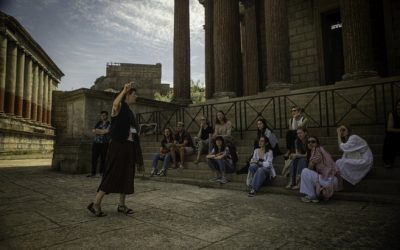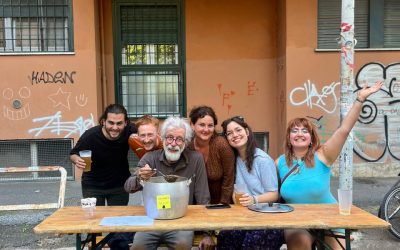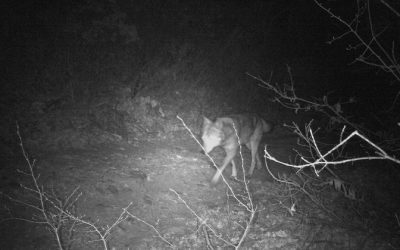People with disabilities
Into the Hills with Che Guevara
The project took place in:
Italy
Workcamp
Written by Mike Crawshaw from United Kingdom
Che Guevara waited for me under the trees, I could see him from my seat in the garden of the small rural tavern that we had stopped at for lunch. Dust lay thick on the narrow road, dogs unmoving in the afternoon heat. I finished my cold beer and, with my group of fellow international volunteers, crossed the road into the paddock.
Grabbing Che under the chin I led him out from the shade and put my foot in the stirrup – Alberto gave me a leg-up, and Che Guevara groaned audibly as I inelegantly dropped my hundred kilo weight into the comfort of his Italian saddle. We were having our day off and Alberto, president of one of the two social cooperatives involved in this Italian version of riding for the disabled, was leading us up into the hills of Lazio.
Ciampacavallo and EquiAzione are two associations that join together to offer social services to the local community. In Italy social services tend to be outsourced to social cooperatives, not for profit organisations set up for specific social purposes. They organize rehabilitation activity, sport and ‘ludic practices’ (learning through fun, basically) for disabled people and people with ‘mental, relational or social disorder’.
In fact, the nature of the black volcanic soil was similar to that of our British chalk downs, and the scenery remarkably alike. Apart from the fact that the temperature was consistently high, rather than the exception of a run of hot sunny days that we get in Britain, it could have been Wiltshire. Pine trees, gorse, broom and a variety of raptors such as buzzards all very familiar. Until Alberto handed us long staffs to ride with – for fending off the wild boars, wolves or wild horses.
We camped in tents, which we had to bring with us. Think of the last festival you went to (in my case Glastonbury 1980) and multiply by five! Fifteen days – not three, two cold shower rooms between all of us. And believe me a cold shower is great when you’ve been helping with the horses in 30+c for four hours.

That’s my tent at the far end – but everyone could still hear me snore after a hard day’s work!
So – what did we actually do? Well, we took some of the children riding through the forest on lead reins. We arranged an afternoon of riding for our disabled friends; we helped to take them to the lake, Largo Albano for swimming and water polo games when the heat got too much; we arranged games for everyone – I am the man who introduced softball to Italy – and great fun it was too: we all went disco dancing on the terrace of a nearby restaurant; we had a night out at the restaurant with pizza and beer; we went into Velletri, the nearest big town, shopping and to see a folk festival; we played a variety of games around the themes of trust and senses – such as leading and being led blindfolded through the forest.
But – we did it together, able and disabled alike. We were a team, I would like to say of equals, but nature has meant that our disabled friends sometimes needed more support. This is not to say that we could not share in their pleasure at the experiences we enjoyed together as friends.
Let’s not forget the horses – integral to the whole ethos of the camp. They were often ‘rescue horses’, classed as unrideable by their owners and written off. Alberto had many examples of these, often called ‘mad’ horses. His approach was to treat them as equals, with rights to a good life and a happy relationship with humans. To prove the truth of his theory he led us into a field of these ‘rejects’.
I have been around horses for years and I have never met such a bunch of sociable, gentle and downright friendly horses. They are pleasant to be around and show their trust by approaching humans with curiosity and a lack of fear. I think that Alberto’s approach works better than any attempt to impose a ‘slave-master’ relationship.I have to say – it wasn’t always easy, sleeping in a sleeping bag on the ground for two weeks takes stamina. Not being able to get up and get a shower, never mind a hot one, is a novelty for most of us. But when it was good – it was very, very good!! You get used to being covered in the grey volcanic dust, and the simple pleasure of a mid-morning or early evening shower becomes a real treat. Life takes on a slower less frenetic pace to which you find your own rhythm adjusting until suddenly you are on a different tempo.
There were difficulties – most of us found the Italian concept of time being elastic to be a charming eccentricity, the equivalent of British formality or some other cultural norm. However, it did irritate some at times – but as a frequent visitor to Italy I find that it is something that has to be accepted and allowed for. Like English rain, it is not likely to change in the near future.
It was hard work – I’m 63 soon, but I found it fine as long as you are averagely fit and enthusiastic. It isn’t a holiday but it is an experience you will never forget; especially the people. Simone ‘Alpino’, our quiet tortoise, never one to rush, who would – every morning – give me the word of the day. Pointing to the sky he would whisper, ‘Sole’ – sun, or ‘Pioggia’ – rain.
The saddest was on the last day when he pointed to our piled up luggage and simply said – ‘Aeroporto’. Thank you for my Italian lessons Simone, I will miss you my friend.
Mike Crawshaw, Volunteer, IVS GB
You can still join!
Want to have your own volunteer experience for peace?
Read more Voices of Volunteers




